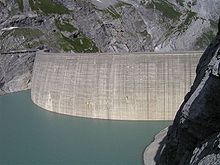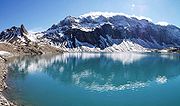Linth–Limmern Power Stations
| Linth–Limmern Power Stations | |
|---|---|
 Upstream face of the Limmern Dam | |
| Country | Switzerland |
| Location | Linthal, Glarus Süd |
| Coordinates | 46°51′00″N 9°0′03″E / 46.85000°N 9.00083°E |
| Status | Operational |
| Construction began | 1957 |
| Opening date | Tierfehd, Linthal: 1964 Mutt: 1965 Tierfehd PS: 2009 Limmern PS: 2017 |
| Owner(s) | Linth-Limmern AG |
| Upper reservoir | |
| Creates | Mutt/Limmern |
| Lower reservoir | |
| Creates | Limmern/Tierfehd |
| Power Station | |
| Hydraulic head | Limmern PS: 623 m (2,044 ft) Tierfehd: 1,045 m (3,428 ft) Linthal: 130 m (427 ft) |
| Turbines | Mutt: 4.4 MW Pelton turbine Limmern: 4 x 250 MW variable-speed Francis pump-turbines Tierfehd: 3 x 87 MW Pelton turbines; 2 x 20 MW Pelton turbines; 1 x 140 MW Francis pump-turbine Linthal: 2 x 17.2 MW Pelton turbines |
| Installed capacity | Mutt: 4.4 MW Limmern: 1,000 MW Tierfehd: 441 MW Linthal: 34.4 MW |
| Annual generation | Mutt: 7 million kWh Tierfehd: 345 million kWh Linthal: 76 million kWh Total: 428 million kWh |
The Linth–Limmern Power Stations are a system of hydroelectric power stations located south of Linthal in the canton of Glarus, Switzerland. The system uses five reservoirs and four power stations at steep variations in altitude.
Works on the complex began in 1957 with the construction of Lake Limmern Dam and the Mutt, Tierfehd and Linthal Power Stations. The dam was complete in 1963 and the power stations were all operational by 1968, with an installed capacity of 340 MW. In 2009, a 140 MW pumped-storage component between Lake Limmern and Tierfehd Reservoir was commissioned. In 2010, construction began on the Linthal 2015 Project, which included the expansion of Lake Mutt and Tierfehd Reservoir, and the addition of the Limmern Power Station, a 1,000 MW pumped-storage component between Lake Mutt and Lake Limmern. Commissioning of the last unit in Limmern was completed by December 2017, bringing the total installed capacity of the system to 1480 MW.
Design and operation
[edit]
The highest reservoir in the complex is Lake Mutt (Muttsee), situated at 2,474 m (8,117 ft) above sea level. It had an original storage capacity of 9,000,000 m3 (7,300 acre⋅ft), and was later expanded to 25,000,000 m3 (20,000 acre⋅ft) during the Linthal 2015 expansion, to hold extra capacity for the new pumped-storage power station. A 2.2 MW solar farm was added to the Muttsee dam in 2021, supplying 3.3 GWh per year.[1]
Below Lake Mutt, the main reservoir in the complex is Lake Limmern (Limmernsee), which was created by a 146 m (479 ft) tall and 375 m (1,230 ft) long arch dam on the Limmern Creek. At an elevation of 1,857 m (6,093 ft) above sea level, it can store up to 92,000,000 m3 (75,000 acre⋅ft) of water.[2]
At an elevation of 1,298 m (4,259 ft) above sea level in an adjacent valley, the Hintersand Balancing Reservoir has a storage capacity of 110,000 m3 (89 acre⋅ft).
The middle reservoir in the complex is the Tierfehd Balancing Reservoir, located at an altitude of 811 m (2,661 ft) above sea level. It was built in 1964 with an original storage capacity of 210,000 m3 (170 acre⋅ft), but was later expanded to 560,000 m3 (450 acre⋅ft) during the Linthal 2015 expansion project.
Finally, the Linthal Balancing Reservoir is located down in the valley at an elevation of 676 m (2,218 ft) above sea level, and withholds 210,000 m3 (170 acre⋅ft) of water.[3][4][5][6] It has a direct discharge into the Linth river.
Between Lake Mutt and Lake Limmern are the Mutt Power Station, in service since 1965 containing a single 4.4 MW Pelton turbine, and the latest expansion to the complex, the Limmern Power Station, which completed commissioning in late 2017 and has four 250 MW Francis pump-turbine. These four reversible pump-turbines are of slip energy recovery variable-speed type. During periods of low demand, water can be pumped from Lake Limmern to Lake Mutt and when energy demand is high, the water is released down for generation. The same turbines that pump the water to Lake Mutt reverse into generator mode. The difference in elevation between the two lakes affords a net hydraulic head of 623 m (2,044 ft).[3][7][4]
Lake Limmern also provides water to the Tierfehd Power Station further down in the valley for conventional hydroelectric generation and pumped-storage. This power station includes three 87 MW Pelton turbines, in service since 1964, and one 140 MW Francis reversible pump-turbine, that was added to the complex in 2009. Additionally, the Hintersand Balancing Reservoir provides water to two 20 MW Pelton turbines also within the Tierfehd Power Station. Also in this Power Station, a 34 MW electrically driven pump allows the transfer of water from Hintersand Reservoir up to Lake Limmern.
Water used for power generation at Tierfehd is discharged into the Tierfehd Balancing Reservoir. The water in this reservoir can either be pumped back up to Lake Limmern or directed down to the Linthal Power Station, which has two 17.2 MW Pelton turbines. From there, the Linthal Power Station discharges the water into the Linthal Balancing Reservoir and into the Linth river.
Standseilbahn Linth-Limmern is a funicular from Tierfehd to the Limmern Power Station.
See also
[edit]- List of pumped-storage hydroelectric power stations
- List of tallest dams in Switzerland
- List of power stations in Switzerland
Notes and references
[edit]- ^ "Switzerland's 2.2-MW alpine solar farm fully operating". Renewablesnow.com. 1 September 2022.
- ^ "Limmern". Swiss Committee on Large Dams. Archived from the original on 15 July 2010. Retrieved 25 January 2012.
- ^ a b "Linthal 2015" (PDF) (in German). Axpo AG. Retrieved 25 January 2012.
- ^ a b "Power plants Linth Limmern AG" (in German). Axpo AG. Archived from the original on 30 May 2012. Retrieved 25 January 2012.
- ^ "Enlargement of the Tierfehd II reservoir". WALO. Archived from the original on 20 January 2013. Retrieved 25 January 2012.
- ^ "Linth-Limmern Power Stations" (PDF). RittMeyer. Archived from the original (PDF) on 3 March 2012. Retrieved 25 January 2012.
- ^ "Linthal 2015 Switzerland". Alstom. Retrieved 25 January 2012.[permanent dead link]
External links
[edit]- Linth-Limmern at Axpo AG
- Drone video
